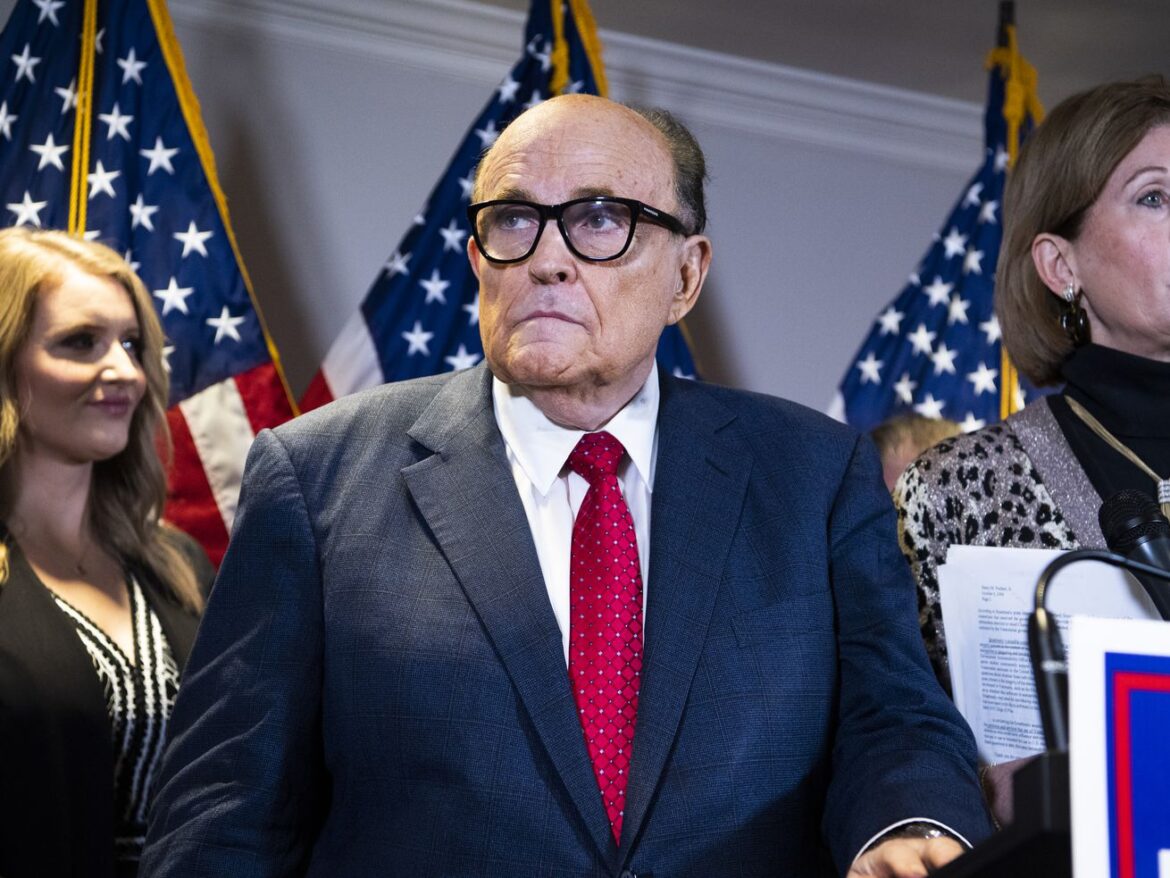What Trump, Giuliani, Meadows, Powell, and others were actually charged with.
The indictment of Donald Trump filed by Fulton County District Attorney Fani Willis is, to put it mildly, complicated.
The core allegation is simple — that Trump and others engaged in a criminal racketeering conspiracy to try and overturn Joe Biden’s win in Georgia (and nationally). But sprawling out from that, the indictment features 19 defendants, 41 charges, and 161 enumerated acts “in furtherance of the conspiracy.”
While every defendant is charged with the main count of being part of the overall conspiracy, the specific charges against them vary. Trump, for instance, is charged with 13 counts overall.
There’s a lot going on. But having dissected the indictment, here’s how I see it: In Willis’s telling, the Trump team’s overall effort to steal the election breaks down into five distinct conspiracies that she argues violated the law in their own right.
Trump is at the center of three of them — the effort to get Georgia officials to change the election outcome, the fake electors plot, and the effort to enlist the US Justice Department to make false claims about Georgia’s results.
Then, there were two other conspiracies carried out by lower-level figures, without known involvement from Trump directly: an effort to intimidate poll worker Ruby Freeman (who Trump’s team had falsely accused of ballot fraud), and a breach of voting data in Coffee County, Georgia.
1) Trump’s effort to get Georgia officials and legislators to change the outcome
Both in public and in private, Trump and his allies repeatedly urged various Republican officials in Georgia, who controlled the legislature and all state offices, to make him the winner of the state instead of Biden. (These efforts all failed.)
This was criminal, Willis argues, both because it’s a solicitation that officials violate their respective oaths of office, and because the conspirators made false statements (fictional claims of ballot fraud and vote-counting malfeasance) as part of this effort. Specifically:
- Trump is charged for urging Georgia House Speaker David Ralston to call a special session to change the state’s outcome.
- Trump and his White House Chief of Staff Mark Meadows are charged for the infamous January 2, 2021 call in which Trump urged Georgia Secretary of State Brad Raffensperger to “find” the exact number of votes he needed to win.
- Trump is also charged for a September 17, 2021 letter in which he urged Raffensperger to decertify Biden’s win.
- Rudy Giuliani, John Eastman, Jenna Ellis, Ray Smith, and Robert Cheeley, all attorneys working with Trump, are charged for urging Georgia’s state senate to change the outcome.
- Giuliani, Smith, and Cheeley are also charged for various false statements they made about purported election fraud at legislative committee meetings.
2) Trump’s fake electors
The Trump team had a plot to assemble what they called their own “alternate” electors from seven states, including Georgia. They hoped that when Congress counted the electoral votes on January 6, Vice President Mike Pence would toss Biden’s electoral votes and decide to count these alternate ones instead. Publicly, Trump’s team pretended the alternative electors were merely a routine measure that could let them file new court challenges.
So on December 14, 2020, as electors around the country met and officially cast their electoral votes, Trump allies convened in a room in Georgia’s state capitol to pretend to do the same. They then sent on the fake electoral votes to the National Archives and to Georgia’s governor’s office.
Willis argues that this violated state laws against impersonating public officers, forgery, making false statements or writings, and filing false documents.
- Trump, Eastman, Giuliani, Smith, and Cheeley are charged with conspiracy to commit all of the above crimes, as are Trump lawyer Kenneth Chesebro and Trump campaign aide Michael Roman. They helped conceive of, organize, or carry out the fake electors plan.
- Three of the fake electors themselves were also charged: Georgia Republican Party Chair David Shafer, state Sen. Shawn Still, and Coffee County GOP Chair Cathy Latham. Per the indictment, the other 11 fake electors are unindicted co-conspirators. (Willis reportedly struck immunity deals with most of them.)
3) Jeff Clark’s effort to have the US Justice Department cast doubt on Georgia’s results
Toward the end of December, in Washington, the acting head of the Justice Department’s civil division, Jeffrey Clark, made a push to get DOJ involved in disputing the election.
Clark wanted to send a letter to Georgia officials claiming DOJ had “identified significant concerns that may have impacted the outcome of the election in multiple States, including the State of Georgia.” The acting attorney general and acting deputy attorney general refused, leading to a showdown in which Trump threatened to put Clark in charge of the Justice Department before backing down.
Willis has charged Clark with a criminal attempt to commit false statements and writings.
4) Trump allies’ effort to influence poll worker Ruby Freeman’s testimony
As Trump’s team scrambled to find anything they could put forward as supposed evidence of election fraud, their attention fell on poll workers Ruby Freeman and Shaye Moss, who worked at Atlanta’s State Farm Arena. Taking an edited video clip out of context, Giuliani and Trump baselessly claimed that Freeman and Moss were engaging in ballot fraud. A torrent of harassment aimed at the pair ensued. (State investigators concluded they did nothing wrong.)
In mid-December, Stephen Lee, a retired police officer and a chaplain from Illinois, twice traveled to Freeman’s home to try and speak with her, apparently hoping she’d confess to fraud. Freeman refused to speak with him and called the police. Lee then reached out to Harrison Floyd, who worked on Black voter outreach for Trump. Per Willis, Lee told Floyd that Freeman “was afraid to talk” to him “because he was a white man,” and asked for assistance.
Floyd then recruited Trevian Kutti, a former publicist for Kanye West. In January 2021, Floyd and Kutti began repeatedly calling and texting Freeman, claiming she was in danger and they were trying to help her, while demanding she tell them about supposed voter fraud. And this was not entirely a freelance effort. The indictment cites records showing extensive calls during this period between the trio and Robert Cheeley, an attorney working with Trump’s team.
For all this, Willis charged Lee, Floyd, and Kutti with solicitation of false statements and influencing witnesses.
5) Trump allies’ breach of voting data in Coffee County, Georgia
Meanwhile, Trump lawyer Sidney Powell was on her own quest to prove voter fraud, one that took her allies to deep-red Coffee County. She had spread conspiracy theories about malfeasance among Dominion voting machines, and retained a data firm, SullivanStrickler, to look into the matter.
On January 7, 2021, Scott Hall — a Georgia bail bondsman who was working with Trump’s team and Powell’s effort — flew to Coffee County. The county GOP chair, Cathy Latham (who was also a fake elector), and the county elections supervisor, Misty Hampton, helped arrange for Hall and the data firm to access the county’s Dominion election equipment and copy data.
Willis charged Powell, Hall, Latham, and Hampton with interference with elections, unlawful possession of ballots, computer theft, computer trespass, computer invasion of privacy, and conspiracy to defraud the state.



